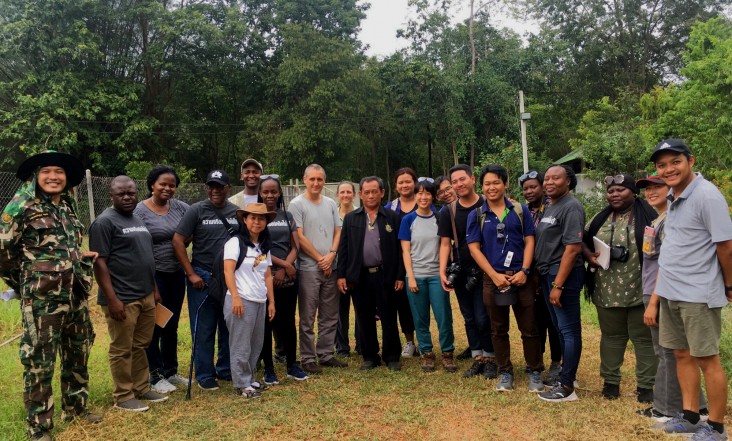Press Release Shim
Speeches Shim

For Immediate Release
BANGKOK – This week in Thailand, journalists from Tanzania joined forces with their Thai counterparts to explore wildlife conservation and trafficking issues. The trip was part of a two-way exchange. In June, Thai journalists traveled to Tanzania to learn about wildlife trafficking from a source country perspective. The Thai side of the exchange focuses on issues related to the demand for illegal wildlife products.
This cross-continental partnership to combat wildlife crime is part of the Asia-Africa Journalists Exchange Program. The program is funded by the United States Agency for International Development (USAID) through USAID Wildlife Asia and USAID Promoting Tanzania’s Environment, Conservation, and Tourism Project (USAID PROTECT). Both projects work closely with journalists to improve their understanding of the importance of wildlife in their countries and regions.
The itineraries of the exchange included meetings with subject matter experts from national and international conservation organizations and government officials and opportunities to visit the field.
In Thailand, journalists visited one of the major amulet markets in Bangkok. They also visited the Bang Pra Water Bird Breeding Center in Chon Buri Province where confiscated exotic species are retained following seizures. A meeting with the Thai Customs Department at Suvarnabhumi International Airport educated journalists on how wildlife is illegally trafficked by air.
Highlights in Tanzania included visiting the Ngorongoro Conservation Area where journalists saw animals in the wild, spoke with rangers about the impacts of trafficking, and observed how communities are engaged in wildlife protection. On a field trip to Tanzania Wildlife Division's anti-poaching unit, journalists learned how the unit works to combat wildlife trafficking and the challenges they face in the field.
“Results from the Tanzania trip confirmed that providing opportunities for journalists to meet with technical experts and engage them in the field, as well as see wild animals such as rhinos and elephants impacted by the illegal wildlife trade, enhanced their understanding of the crisis. First-hand knowledge is essential in helping journalists better develop their stories,” said Bronwyn Llewellyn, lead for USAID conservation activities at U.S. Embassy in Tanzania.
The exchange provided the journalists an opportunity to take photos and video footage as well as interview a wide variety of experts to develop media stories. It also allowed them to discuss their roles in combating wildlife crime and share their experiences when covering counter wildlife trafficking stories, the challenges they face, and issues with media safety.
“The media play a very important role by raising awareness and focusing attention on the impacts of wildlife trafficking,” said Cristina Velez Srinivasan, Ecosystems Management & Trade Team Lead for USAID’s Regional Development Mission for Asia.
The long-term aim of the exchange is to provide a platform for journalists to develop a network of dedicated and committed individuals working together to report regularly and consistently on wildlife trafficking.
“It is our hope that exchange programs such as this encourage the media to increase the coverage of illegal wildlife crimes and that the stories produced spur the public to demand protection of wildlife,” Srinivasan said.
The exchange was organized by USAID Wildlife Asia, USAID PROTECT, Journalists’ Environmental Association of Tanzania, Thai Society of Environmental Journalists, and Thai Public Broadcasting Service.
About USAID Wildlife Asia
The USAID Wildlife Asia activity works to address wildlife trafficking as a transnational crime. The project aims to reduce consumer demand for wildlife parts and products, strengthen law enforcement, enhance legal and political commitment, and support regional collaboration to reduce wildlife crime in Southeast Asia. USAID Wildlife Asia focuses on four species: elephant, rhinoceros, tiger and pangolin. For more information, please visit www.usaidwildlifeasia.org
About USAID PROTECT
The Promoting Tanzania's Environment, Conservation, and Tourism Project or USAID PTOTECT partners with wildlife, conservation, and tourism organizations in Tanzania to address threats to biodiversity conservation and private sector-led tourism growth.
About Thai Society of Environmental Journalists
Thai Society of Environmental Journalists (TSEJ) is part of the Thai Journalists Association. TSEJ brings together Thai journalists who cover environmental issues ranging from, but not limited to, conservation, wildlife trafficking, environmental development, natural resources and climate change.
Journalists’ Environmental Association of Tanzania (JET)
JET is a non-Governmental Organization dedicate to raise public awareness on Sustainable Management of Natural Resources. Currently JET is implementing a media and journalist training on biodiversity conservation to support the efforts of the government of Tanzania and other players to conserve biodiversity.
About Thai Public Broadcasting Service
Thai Public Broadcasting Service (Thai PBS) is Thailand’s first public broadcasting service. It is established by the Thai Public Broadcasting Service Act, BE 2551 (2008), which came into force on January 15, 2008. Thai PBS is committed to active and informed citizens of the society with its diverse educational and entertainment programs while strictly abiding by the code of ethics that ensures fair, balanced and impartial news coverage. Thai PBS’s vision is to be a public media institution that strives to promote a just and an informed society. https://en.thaipbs.or.th/
● Download photos here [https://flic.kr/s/aHsmGp5m2u]
READ MORE
Related Press Releases
- New Clinic Affirms U.S.-Thai Commitment to HIV Services in Thailand
- Statement by USAID Acting Administrator John Barsa Announcing Funding for Programs in Global Health Under the New Partnerships Initiative
- COVID-19: United States and UNICEF Join Forces to Protect the Most Vulnerable including Migrants in Thailand

Comment
Make a general inquiry or suggest an improvement.